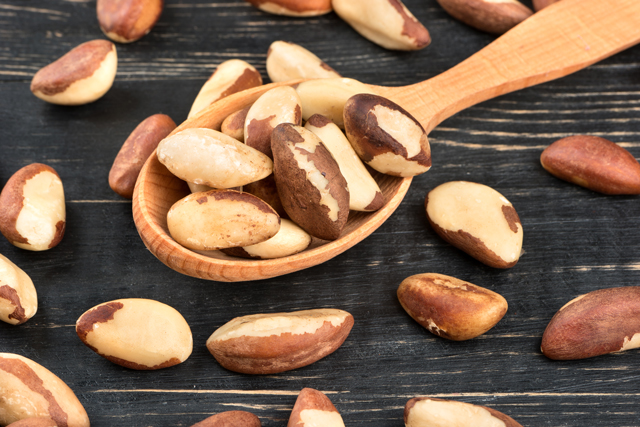A daily serving of Brazil nuts helps control your weight and manage blood sugar levels
02/01/2019 / By Michelle Simmons

Nuts have been extensively studied for their nutritional content and potential in keeping the heart healthy. Recently, two separate studies have added more insights into the health benefits of nuts, particularly Brazil nuts.
Both studies were presented at the American Heart Association’s Scientific Sessions 2018; one study reveals that eating nuts like Brazil nuts helps in weight management, while the other study suggests that Brazil nut consumption increases a sense of fullness and improves glucose and insulin responses. (Related: Nuts may be tiny but they are powerhouses when it comes to improving your health.)
Brazil nuts, which come from the Brazil nut tree, are enclosed in a round, coconut-like shell. They can be eaten raw or blanched. They are known to regulate blood pressure, lower cholesterol, and support the nervous and immune systems. They also contain calcium, magnesium, protein, zinc, vitamin E, and some B vitamins.
Nut consumption and weight management
In the study of nut consumption’s effect on weight, researchers assessed the nut consumption of more than 125,000 healthy professionals from different study groups through a food-frequency questionnaire every four years. The participants included 25,394 men from the Health Professionals Follow-up Study, 53,541 women from the Nurse’s Health Study, and 47,255 women from the Nurse’s Health Study II in follow-up research.
The researchers found that eating one serving or an ounce of any type of nuts, such as Brazil nuts, every day was linked to a lower risk of weight gain and obesity in the long term. Replacing one serving of red meat, processed meat, French fries, desserts, or potato chips with a daily serving of any type of nut was linked to less weight gain over the four-year intervals.
“Adding one ounce of nuts to your diet in place of less healthy foods — such as red or processed meat, French fries or sugary snacks — may help prevent that slow, gradual weight gain after you enter adulthood and reduce the risk of obesity-related cardiovascular diseases,” explained Xiaoran Liu, first author of the study and a research associate in the nutrition department of Harvard School of Public Health in Boston, Massachusetts.
Brazil nuts and diabetes prevention
The other study, which was carried out by researchers from San Diego State University, looked at the effect of eating Brazil nuts on the feeling of fullness, blood sugar levels, and insulin responses. To do this, researchers recruited 22 healthy adults aged 20 or older with an average body mass index (BMI) of 22.3.
The researchers gave the participants either 36 g of pretzels or 20 g of Brazil nuts on top of their normal diet. The Brazil nuts and pretzels contain almost the same amount of calories and sodium. To prevent carryover effects, the participants consumed either the pretzels or the nuts in two trials with a washout period of at least 48 hours.
The results showed that both Brazil nuts and pretzels dramatically increased the participants’ sense of fullness and reduced their feelings of hunger. However, these effects were greater in the Brazil nuts group compared to the pretzel group.
In addition, the researchers found that eating pretzels led to a substantial increase in blood sugar and insulin levels 40 minutes after. On the other hand, consumption of Brazil nuts did not significantly affect blood sugar or insulin levels. These results suggest that eating Brazil nuts prevented spikes in blood sugar and insulin levels after eating, which may help prevent diabetes and weight gain.
The researchers believe that these beneficial effects of consuming Brazil nuts may be attributed to its high selenium content, a mineral that has been previously linked to improvements in blood sugar and insulin responses. These nuts are actually the richest known food source of selenium.
Mee Young Hong, the senior author of the study and a professor at San Diego State University, believes that their study will encourage researchers and clinicians to consider Brazil nuts consumption as a way to reduce the risk of obesity and diabetes.
Sources include:
Submit a correction >>
Tagged Under:
blood glucose, blood sugar, Brazil nuts, diabetes, food cures, insulin, nuts, obese, obesity, weight management
This article may contain statements that reflect the opinion of the author
RECENT NEWS & ARTICLES
FoodCures.News is a fact-based public education website published by Food Cures News Features, LLC.
All content copyright © 2018 by Food Cures News Features, LLC.
Contact Us with Tips or Corrections
All trademarks, registered trademarks and servicemarks mentioned on this site are the property of their respective owners.





















